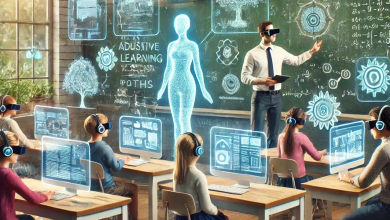Education in the twenty-first century looks very different from a generation ago. The demands of a shifting global economy, combined with the influence of digital technology on everyday life, are redefining what it means to be prepared for the future. Students today must navigate complexity, engage across cultures, and remain adaptable long after their formal schooling ends.
In response, families are seeking educational institutions that can prepare young people for such realities. For those exploring global options, choosing an international school in Singapore offers precisely that: an environment built to support lifelong learning and global preparedness.
This article explores how international schools in the city-state are responding to the changing educational landscape and what that means for preparing students to thrive in the years ahead.
Curricula Designed for a Globalized World
In Singapore, international schools serve a diverse student population with varied academic goals and cultural backgrounds. To meet these needs, many offer multiple pathways, including the International Baccalaureate (IB), Advanced Placement (AP), the Business and Technology Education Council (BTEC) programs, and several more. This flexibility allows students to pursue subjects that align with their strengths and interests, as well as their future aspirations.
Beyond offering choice, each of these academic pathways supports the development of globally relevant competencies. Students not only engage with interdisciplinary content and explore diverse modes of assessment, but they also learn to apply knowledge in real-world contexts. Exposure to multiple curricula or to a global curriculum also fosters intercultural awareness, encouraging learners to consider perspectives beyond their own and to collaborate with others from different backgrounds.
Indeed, combining academic rigor with adaptability allows international schools in Singapore to equip students with both subject mastery and transferable skills. Learners move across disciplines, encountering different approaches to problem-solving and inquiry while building a foundation that reflects current global standards.
Cultivating Skills Beyond Academics
Academic knowledge alone no longer guarantees success in the twenty-first century. Universities and employers alike prioritize qualities such as creativity and the ability to collaborate, and even adaptability, traits best nurtured through experiences that extend beyond traditional instruction. International schools in Singapore have responded by embedding these competencies into everyday learning, highlighting them in project-based tasks and community engagement activities.
Classrooms often reflect the city-state’s cultural diversity, creating opportunities for students to listen actively and express ideas clearly. These interactions also challenge them to navigate differing viewpoints with empathy and confidence. Outside the classroom, service learning initiatives and extracurricular programs further encourage leadership and personal growth.
Rather than treating these attributes as secondary, international schools in Singapore place them at the heart of their educational approach. In doing so, they foster environments where students grow not only as thinkers and communicators but as collaborators and contributors in an increasingly complex world.
Balancing Technology with Human-Centered Learning
Walk into any international school in Singapore today, and it is common to see students experimenting with robotics, engaging in virtual simulations, collaborating through digital platforms, and even designing 3D models. Technology is woven into the fabric of classroom life, not as a novelty, but as a means to strengthen students’ ability to exercise inquiry and to spark creativity in them.
Still, the use of devices and digital systems is never intended to replace human interaction. Educators emphasize balance by pairing advanced tools with face-to-face dialogue and ethical reflection, and also critical thinking. For instance, a science lesson may involve both data modeling software and hands-on experiments; a history class might combine online archives with student-led debates. These layered experiences help students develop technological fluency while strengthening the interpersonal skills essential across disciplines.
This approach reflects a broader commitment to responsible innovation. Integrating digital literacy with human-centered values allows international schools in Singapore to ensure that students not only master emerging tools but also understand their impact, both socially and ethically.
Supporting Student Well-Being and Balance
A 2024 survey from the National University of Singapore found that 53 percent of students reported elevated stress, with nearly one in three at risk of anxiety or depression. These figures highlight the urgency of addressing student well-being, even within high-performing education systems.
International schools in Singapore treat this challenge not as peripheral, but as central to learning. Programs that address emotional resilience, physical activity, and healthy relationships sit alongside academics, reflecting a recognition that students thrive when their full spectrum of needs is met.
Counseling services, wellness workshops, and structured activities provide avenues for managing stress and building healthy habits. Meanwhile, initiatives that connect students to their communities nurture a sense of belonging and shared purpose.
Such practices affirm that intellectual growth cannot be separated from social and emotional development. This holistic perspective helps international schools in Singapore create spaces where students feel seen and supported, and, more importantly, equipped to navigate both academic demands and personal growth with confidence.
Preparing Pathways for Higher Education and Lifelong Success
Graduating from secondary school is only the beginning of a much longer journey. International schools in Singapore design their programs with this in mind, offering students the academic credentials and practical skills needed to pursue a range of futures. Whether aiming for competitive universities or vocational training, learners can choose pathways that align with their ambitions.
Support systems such as mentorship, career guidance, and advisory programs help students clarify their strengths and make informed decisions. Exposure to frameworks like IB, AP, and BTEC ensures graduates are well-positioned to navigate global admissions processes with confidence. Just as importantly, these experiences cultivate habits of initiative and long-term planning.
Unlike many traditional schools that emphasize a linear academic path, international schools in Singapore support diverse pathways. This enables learners to explore options and prepare for futures that may span universities, companies, industries, and global contexts.
As the demands of the modern world continue to shift, education must evolve not just in content but also in terms of purpose. In Singapore, international schools respond to this challenge with approaches that nurture academic achievement while honoring the human dimensions of learning. For families seeking future-ready education, these schools offer more than credentials; they offer a foundation for lifelong learning shaped by curiosity and the ability to meet change with clarity.



